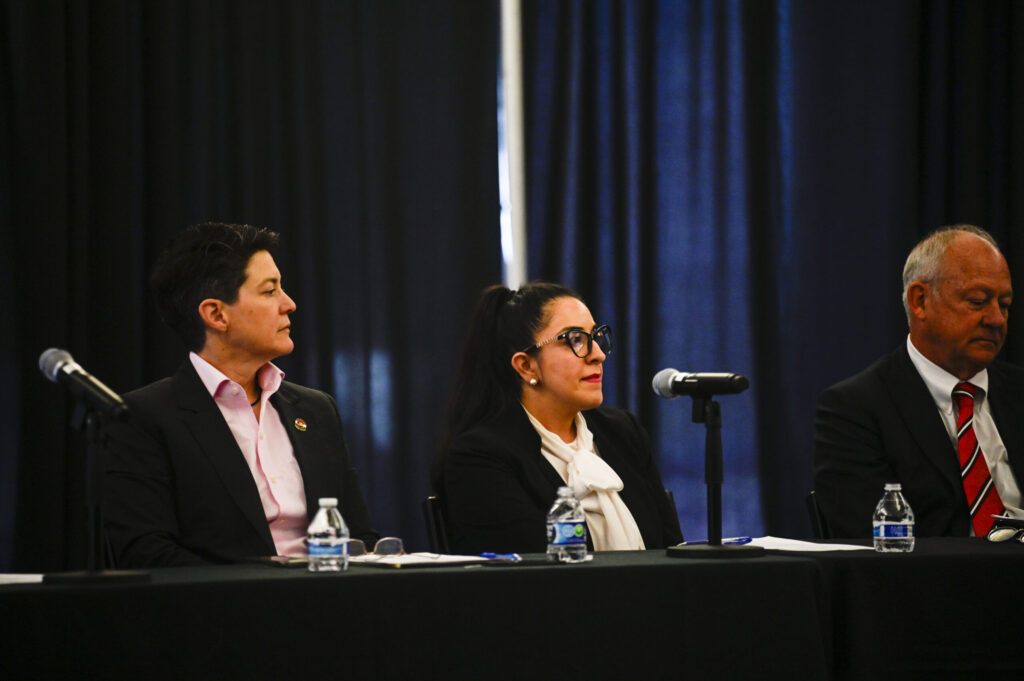Judge declines to transfer foreign murder trial out of Colorado, says venue is proper

A federal judge rejected the narrative from a man accused of murdering his wife on an African safari that U.S. prosecutors improperly charged the defendant in Colorado as part of a scheme to evade a 232-year-old law.
The trial of Lawrence Rudolph, set to begin on July 11, will remain in Colorado despite the defense’s attempt to transfer or dismiss the foreign murder charge against him. A grand jury recently indicted Rudolph for allegedly killing his wife, Bianca Rudolph, around Oct. 11, 2016 while the two were on safari in Zambia. He also faces a charge of mail fraud for reportedly misrepresenting the cause of Bianca’s death in order to obtain $4.9 million in life insurance claims.
The fraud charge stemmed from insurance documents mailed to an address in Englewood. Authorities in Mexico, where Rudolph was on vacation, detained and deported Rudolph in late December 2021, and law enforcement arrested him at Denver International Airport.
Rudolph challenged the authority of the federal government to charge him with foreign murder in Colorado, pointing to a law originally enacted in 1790 that requires trials for crimes committed outside the country or on the “high seas” to take place wherever a defendant was arrested or “first brought.” Because “a commercial airline that landed in Atlanta, Georgia” first brought Rudolph to the United States after his alleged overseas murder, the Northern District of Georgia was the proper venue for his trial, he argued.
U.S. District Court Judge William J. Martínez rejected that line of thinking.
“To the extent Congress wanted to clarify that the phrase ‘first brought’ means the location that an offender first arrives of his own volition after allegedly completing his crime, it could have done so. It did not,” Martínez wrote in an April 26 order.
The defense had accused prosecutors of “cherry-picking” Colorado as the location to charge Rudolph for foreign murder. His lawyers noted that authorities could have arrested Rudolph in Arizona, where he lived, but waited until he was out of the country to seek his extradition to Colorado. Those tactics allegedly ran contrary to the 1790 law that permitted trials only where a defendant was arrested, “first brought” or, as the law now reads, last resided.
The law “reflects the Founding Fathers’ firm belief that giving prosecutors their choice of venue is inherently unfair,” Rudolph’s lawyers wrote.
In arguing their case for a change of venue, the defense referenced an 1832 appellate decision from Massachusetts involving a revolt on the high seas. U.S. Supreme Court Justice Joseph Story noted that the 1790 law providing for alternative trial locations was intended for “general convenience.” A ship may have to seek refuge away from its home port due to weather or the defendant may escape into another jurisdiction, making some degree of flexibility necessary when trying crimes that occur outside of the United States, Story wrote.
Because Rudolph was arrested in Mexico, the defense argued, his trial location had to be where he was first brought after committing his crime: Georgia.
The government found fault with that reading of the law and attempted to justify Colorado as the trial venue. First, Mexico only deported Rudolph, meaning he was arrested in Denver. Second, the 1790 law requiring defendants to be tried where they are first brought only applies when there are criminal charges against them.
“His flight to Atlanta right after he murdered his wife is irrelevant because no authorities brought him to Atlanta under restraint in connection with the murder,” wrote the U.S. Attorney’s Office for Colorado.
Martínez agreed with the government that Colorado was where Rudolph was first brought in connection with the criminal charges. The 1790 law and its subsequent modifications gave prosecutors options for trying crimes occurring outside of the United States, and, with Rudolph’s case, “the government merely exercised that choice,” the judge wrote.
He also refused to dismiss the foreign murder charge because, Rudolph claimed, it did not allege sufficient facts to establish Colorado was the correct place for trial. Martínez instead found that the charge correctly listed the key elements of the offense and sufficiently put Rudolph on notice of the allegations.
Martínez previously rebuffed Rudolph’s request to be detained in, effectively, a private home-based jail pending trial.
The case is United States v. Rudolph et al.














